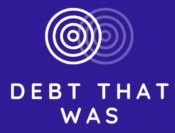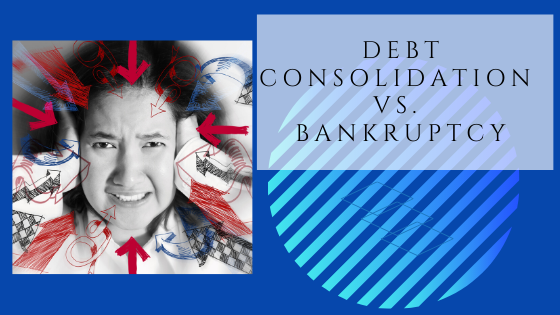Drowning in debt is a scary experience and not a place you want to stay. Thankfully, there are legal paths you can take to obtain relief and hope for the future. Today we’re going to compare two of the most common: Debt Consolidation vs. Bankruptcy. We’ll look at both of them to help you better understand the options and then draw comparisons for determining which course is better under different circumstances. When in serious debt, you don’t want to make quick decisions. You must do your research and consider all of your options first.
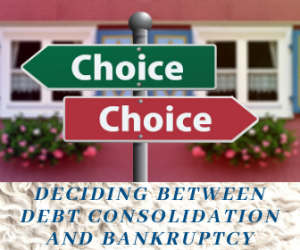
Table of Contents
ToggleWhat is Debt Consolidation?
Debt consolidation is a form of debt refinancing that involves taking out a loan to pay off multiple other existing debts. The debtor then has one loan with a single financial institution instead of multiple with various creditors. Most consolidation loans require security in the same way that a mortgage does.
Advantages of Debt Consolidation:
Simpler and easier debt management.
Once you’ve consolidated, you’ll have one monthly payment to a single creditor to keep track of, rather than multiple payments to multiple creditors. Making just one payment is more convenient, saves you time, and can make life less stressful.
Potentially lower interest rate.
With debt consolidation, you may be able to obtain a loan with a lower interest rate than that of your existing debts. The reduction in rate will depend mostly on your credit rating and history, as poor credit will mean a higher interest rate. Aside from the interest rate, you may also find an arrangement with smaller monthly payments. Lower payments will mean more cash available to take care of your business or personal needs.
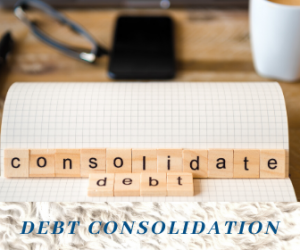
Preserve your reputation and credit rating.
As we’ll discuss later, bankruptcy is a matter of public record. If you declare bankruptcy, anyone can find a record of it if they look online or in bankruptcy court documents. Bankruptcy will have a significant negative impact on your credit score. A consolidation loan will generally show up on your credit report, but should not affect your credit score. Consolidation is overall much better for handling your debt situation quietly and not damaging your reputation.
Continued access to credit.
Most debt consolidation agreements allow you to keep your credit cards. However, if you already owe a significant amount of money on them and are in default, you may not be able to use them. Also, be careful using your credit cards as this may defeat the purpose of debt consolidation. It’s good to have the option to use them for emergencies.
Disadvantages of Debt Consolidation:
Although there are benefits to debt consolidation, there are also risks and problems to keep in mind.
Watch out for hidden costs with debt consolidation.
It’s more than possible to end up paying more through consolidation than you already owe. The costs of consolidation are why it’s essential to get professional, trustworthy advice, and do the math. Even if a bank offers you a lower interest rate and smaller monthly payments, you may end up paying more money because of the extended period. A longer period for the debt will mean a higher number of payments. Lower payments may be what you need for short term relief so you can get back on your feet, but be aware that you will be paying for longer.
The potential loss of your property.
If you use property such as your home or vehicles for collateral, you risk losing that property if you default on the consolidation loan. You also have to consider cross-consolidation. Cross-consolidation means that if your lender already financed other property you own, that property can be repossessed if you default on the consolidation loan.
Adverse tax consequences.
If you do end up saving money as a result of debt consolidation, it will be considered taxable income by the IRS. Generally, the savings will still be worth it since only a small percentage will be taxed. The worry is that the income could push you into a higher income tax bracket.
What is Bankruptcy?
Bankruptcy is a legal proceeding in which a judge and court trustee evaluate the assets and liabilities of an individual or business who cannot repay amounts they owe to creditors. The purpose of the proceeding is to determine whether or not the entity is insolvent. If the entity is insolvent, some or all of the debts may be discharged.
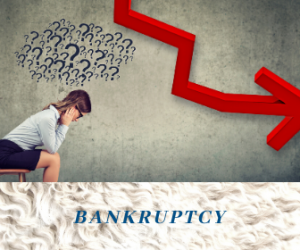
Bankruptcy is regulated by laws, which were established to give those whose finances have collapsed a chance to reset and start fresh, while at the same time protecting the rights of creditors. A debtor will file a case with a United States Bankruptcy Court (subdivisions of US District Courts).
There are quite a few different types of bankruptcy, but we’re going to look at three that are by far the most common. The types of bankruptcy are named by the chapter of the US code they appear.
Chapter 7 Bankruptcy
Chapter 7 is the most commonly filed bankruptcy. A bankruptcy trustee cancels some or all of your debts. Creditors may take proceeds from the sale of your property. The entire process takes about 4 to 6 months, but it commonly requires only one trip to the courthouse. You won’t be able to file under Chapter 7 if you have already received a bankruptcy discharge in the last eight years. Filing involves filling out several forms with financial information. You will have to declare your debts, assets, and income.
Upon filing, an “automatic stay” is ordered, which temporarily prevents creditors from trying to collect debts from you. At the same time, you cannot sell any of your property or pay off any existing debts. Usually a week or two after filing, a meeting with you and all your creditors is called. The trustee will lead the session.
After the meeting, the trustee will determine how much of your debts should be canceled and what can be paid. The trustee may sell some of your property to pay debts, but other property is exempt and protected. How much each creditor will receive and the order they will be paid in depends on the nature of the debt. One factor will be whether or not a debt was secured. The bankruptcy court then discharges any remaining debts.
Chapter 11 Bankruptcy
Chapter 11 is designed to allow struggling businesses to restructure their finances in a way that maximizes the return of creditors and owners. Examples of large corporations that have filed Chapter 11 bankruptcy include General Motors and K-Mart.
After filing under Chapter 11, the business continues operations, but the court handles major financial decisions. A committee of creditors is then formed to provide input in developing a reorganization plan. The debtor may object to the plan, but the ultimate authority to approve the proposed restructuring lies with the bankruptcy court.
Chapter 13 Bankruptcy
Chapter 13 bankruptcy is only available for individuals. It is for debtors with substantial income who wish to protect their assets from Chapter 7 Bankruptcy. There are limits to how much debt the individual can have, and they must have a steady income. Chapter 13 involves setting up a repayment plan where the debtor will repay debts in a period of 3 to 5 years.
You will propose the repayment plan, and then the trustee and creditors will review the proposal and express any objections. If there are no objections, the presiding judge will approve the plan.
Advantages of Bankruptcy
A fresh start.
Through Chapter 7 bankruptcy, most of your unsecured debts (such as credit cards or medicals bills) may be canceled. The lack of debt allows you to move on with freedom. You will be able to focus on rebuilding your future rather than drowning in stress and worry.
Protection from creditors.
If you’ve been in debt for a while and defaulted on payments, you’re probably used to persistent calls from creditors, reminding you to pay. As soon as you file for bankruptcy, you get the protection of an automatic stay. Under Chapter 7, when debts are canceled, you won’t have to worry about those creditors.
Disadvantages of Bankruptcy
Bankruptcy causes adverse impact on credit score.
Bankruptcy will lower your credit rating substantially. The filing will usually remain on your credit report for 7 – 10 years. However, your credit score is probably low anyway, so the effect may not matter so much. Once you have freedom from debt, you will be in better financial shape. Some creditors will even seek out those who’ve filed bankruptcy because of the eight-year limit on filing again.
Reputation and privacy.
Future employers may find out about your bankruptcy filing if they do a credit check, or through payroll deductions. On the bright side, family and friends are unlikely to find out unless you owe them money.
Debt Consolidation vs. Bankruptcy Summary
The decision depends on your situation and the reasons you became overwhelmed by debt. Bankruptcy is best to avoid, but it can be better than debt consolidation. If you take out a new loan and find you can’t pay it back, that can be even worse. If you still have a decent credit score, that will help you get a consolidation loan with a lower interest rate. Another factor is the ability to pinpoint why you defaulted in the first place. The cause will help you determine your ability to pay in the future. If it was a one-time incident or loss that brought you into financial hardship, and you still have a steady income or good economic prospects, consolidation may be the best choice.
A secured credit card may also be an issue when considering debt consolidation vs. bankruptcy.
Bankruptcy makes more sense in cases where your debts are incredibly overwhelming, and your income is unlikely to be sufficient to make payments in the future. Before you decide to file, evaluate your debts, assets, and income. Make sure you have a firm grasp of where you’re at financially. You should also talk to a professional to help you determine the best course of action. The key to making the right decision here is understanding your situation and the options available.
